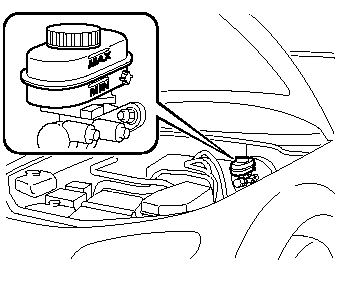Brake/Clutch Fluid
qInspecting Brake/Clutch Fluid Level

The brakes and clutch draw fluid from the same reservoir.
Inspect the fluid level in the reservoir regularly. It should be kept at MAX.
The level normally drops with accumulated distance, a condition associated with wear of brake and clutch linings. If it is excessively low, have the brake/clutch system inspected by an Authorized Mazda Dealer.
Adding Brake/Clutch Fluid
WARNING:
Be careful not to spill brake fluid on yourself or on the engine: Spilled brake fluid is dangerous. If it gets in your eyes, they could be seriously injured. If this happens, immediately flush your eyes with water and get medical attention.
Brake fluid spilled on a hot engine could cause a fire.
If the brake/clutch fluid level is low, have the brakes and clutch inspected: Low brake/clutch fluid levels are dangerous. Low levels could signal brake lining wear or a brake system leak. Your brakes could fail and cause an accident.
If the fluid level is low, add fluid until it reaches MAX.
Before adding fluid, thoroughly clean the area around the cap.
CAUTION:
 Brake and clutch fluid will
Brake and clutch fluid will
damage painted surfaces. If brake
or clutch fluid does get on a
painted surface, wash it off with
water immediately.
 Using nonspecified brake and
Using nonspecified brake and
clutch fluids will
damage the systems. Mixing
different fluids will also damage
them.
If the brake/clutch system frequently requires new fluid, consult an Authorized Mazda Dealer.
See also:
Sunvisors
When you need a sunvisor, lower it for
use in front or swing it to the side.
Side Extension Sunvisors
The visor extender extends the sunvisor's
range of sun shading.
To use, pull it out.
CAU ...
Dynamic Performance
With the Mazda 2, Mazda evolved the athleticism that is inherent to the Mazda design DNA in pursuit of bold and diverse expression of movement. The basic form of the new Mazda 2 is characterized by ...
Rear
1. Rear wiper blade.
2. Liftgate.
3. Light bulbs.
4. Antenna.
5. Child safety locks.
6. Outside mirror.
7. Tires. ...


